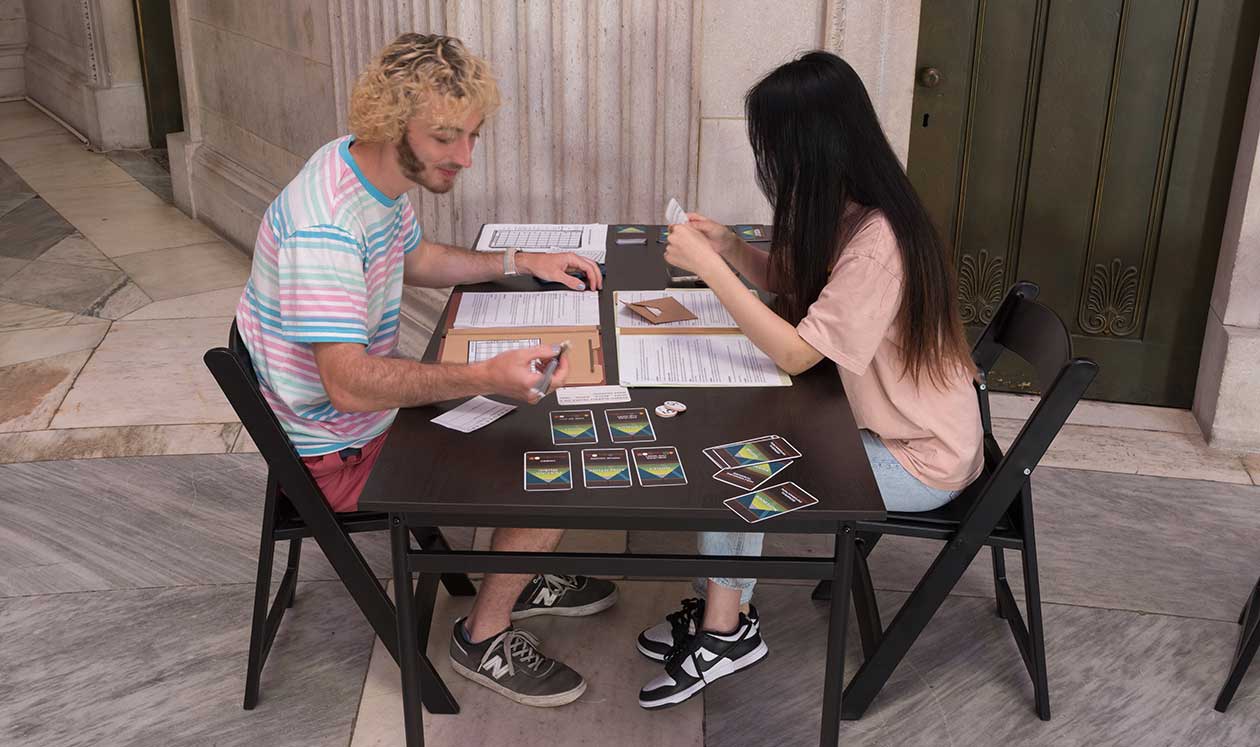Fifth Amendment
No person shall be held to answer for a capital, or otherwise infamous crime, unless on a presentment or indictment of a Grand Jury, except in cases arising in the land or naval forces, or in the Militia, when in actual service in time of War or public danger; nor shall any person be subject for the same offence to be twice put in jeopardy of life or limb; nor shall be compelled in any criminal case to be a witness against himself, nor be deprived of life, liberty, or property, without due process of law; nor shall private property be taken for public use, without just compensation.

Photo by John Berens
Shawn Pierre
___ vs. ___, 2022
table, chairs, custom game-card decks, game tokens, game folders, writing materials, papers, paper clips, overhead lighting
Dimensions variable
Artist Commentary
___ vs. ___ is a verbal deduction game for two players, one Suspect and one Investigator, each with their own goals. For the Investigator to win, they need to figure out which crime the Suspect committed, while the Suspect is trying to trick the Investigator into picking a crime they cannot be convicted of due to the Double Jeopardy Clause. To begin, the Suspect pulls cards from the Crime Deck without showing the Investigator and chooses two crimes—one to be the Committed Crime and one to be the Double Jeopardy Crime—then writes them down and encloses them in an envelope. Following this, the Suspect and the Investigator pull from a variety of other decks that determine what topics can be discussed during the questioning and what information the Suspect can provide. After agreeing on a list of rules from the Miranda Rights document, the Investigator questions the Suspect in hopes of deducing the crime, while the Suspect chooses when to tell the truth or when to lie with the hope of tricking the Investigator into selecting the wrong crime.
Have I used the Fifth Amendment? Yes, but never correctly, and never in any sort of actual legal situation. Normally, I used it when I refused to admit to friends that I did something I shouldn’t have. Everyone knew that I was avoiding telling the truth. It was just a fun thing to say, unless you were on the receiving end of whatever action I was denying.
These feelings of smug joy when playfully declining to share information and of frustration when someone does not admit to something are emotions that I want to capture with ___ vs ___ (read as “blank versus blank”). One person is trying their hardest to find out the truth, and the other person is trying their best to frustrate and mislead. The situation is only intensified when the people involved in this interaction know each other. ___ vs ___ plays off these feelings: the hopes of finding the truth, the fear of being found out, and the suspense of getting closer and closer to the end of the game without knowing who has the advantage.
___ vs ___ plays off a few pieces of the Fifth Amendment—more specifically, the Miranda warnings, double jeopardy, and the self-incrimination clause. At the beginning of the game, players agree on the Miranda Rights document, rules, and rights they can enact to help their play or hinder their opponent. During the game, the Suspect can “Plead the Fifth Amendment” when they feel the Investigator is getting too close to solving the crime they committed. Finally, the Investigator must do their best to make sure they do not pick the crime that the Suspect already committed. Failing to do so will result in the Suspect winning due to the Double Jeopardy Clause.
It is understandably tricky to balance a game that asks players to mislead their opponents using information they create on the fly. Much of this relies on how confident a person feels and if they can evade the truth or weed their way through their opponent’s deception. Ultimately, the experience really comes to life when playing with someone you know well, as players will make assumptions based on information that isn’t present. Rather than avoiding that feeling, a feeling that people would fall into naturally, I found that the game was successful when I leaned into those emotions. These emotions help make the interactions between the Suspect and the Investigator unique, something that can’t be duplicated but can be understood by others who have participated in the game.

Photo by Shay Salehi
Curator Commentary
Viewed from the lens of game design, the third clause of the Fifth Amendment—the source of the right against self-incrimination—appears to be a special-case rule to patch over a loophole in the overarching principles of truthful testimony under oath and the presumption of innocence until proven guilty—if the accused can be compelled under oath to implicate themself, how can they be guaranteed the presumption of innocence? This patch, however, led to an exploit: “On the advice of counsel, I invoke my Fifth Amendment right against self-incrimination.” Pleading the Fifth has been viewed as within the letter of the law yet also outside the spirit of fair play within the careful constructs of the US court system. It is a cultural shorthand for the divide between those privileged enough to obtain top-shelf legal support and everyone else.
The Fifth Amendment finds a second life outside the courts—as an often playful, “wink, wink, nudge, nudge” nondenial of something one doesn’t want to own up to. It is from this perspective that Shawn Pierre approaches the Fifth Amendment in ___ vs ___. Emerging from the popular social deduction game genre, Pierre’s game surfaces the tensions inherent in pleading the Fifth—one’s guilt is presumed but not outright stated. Social deduction games ask players to work together to accomplish a goal while also trying to figure out who amongst them is working against the group. In ___ vs ___, one player attempts to get the truth from the other without the suspect invoking the Fifth.
Pierre’s game recontextualizes the playful embodiment of the Fifth Amendment in a light narrative context: that of a simple interrogation room complete with a plain table, sturdy (but not so comfortable) chairs, folders containing paperwork, and, of course, that signature bright light. Consider it a simple set on which the cat-and-mouse game of interrogation and (maybe?) confession unfold.
Shawn Pierre is a Visiting Assistant Arts Professor at the NYU Game Center and game designer working to combine new forms of play with different types of media. His work includes voice-controlled adventure games, social deduction SMS games, and physical games where players capture others in nets. In the past, Shawn has created and worked on crowd-based interactive activities, including installments at Graceland, as well as games for major sporting events. As a member and Project Director of Philly Game Mechanics, Shawn works to build a community where local creators meet new people and share their creative work.
1
Freedom of Religion, Speech, Press, Assembly, Petition
Congress shall make no law respecting an establishment of religion, or prohibiting the free exercise thereof; or abridging the freedom of speech, or of the press; or the right of the people peaceably to assemble, and to petition the Government for a redress of grievances.
2
The Right to Bear Arms
A well regulated Militia, being necessary to the security of a free State, the right of the people to keep and bear Arms, shall not be infringed.
3
The Housing of Soldiers
No Soldier shall, in time of peace be quartered in any house, without the consent of the Owner, nor in time of war, but in a manner to be prescribed by law.
4
Unreasonable Search and Seizure, Warrants, Probable Cause
The right of the people to be secure in their persons, houses, papers, and effects, against unreasonable searches and seizures, shall not be violated, and no Warrants shall issue, but upon probable cause, supported by Oath or affirmation, and particularly describing the place to be searched, and the persons or things to be seized.
5
Due Process, Self-Incrimination, Eminent Domain
No person shall be held to answer for a capital, or otherwise infamous crime, unless on a presentment or indictment of a Grand Jury, except in cases arising in the land or naval forces, or in the Militia, when in actual service in time of War or public danger; nor shall any person be subject for the same offence to be twice put in jeopardy of life or limb; nor shall be compelled in any criminal case to be a witness against himself, nor be deprived of life, liberty, or property, without due process of law; nor shall private property be taken for public use, without just compensation.
6
Rights of Defendents in Criminal Trial
In all criminal prosecutions, the accused shall enjoy the right to a speedy and public trial, by an impartial jury of the State and district wherein the crime shall have been committed, which district shall have been previously ascertained by law, and to be informed of the nature and cause of the accusation; to be confronted with the witnesses against him; to have compulsory process for obtaining witnesses in his favor, and to have the Assistance of Counsel for his defense.
7
Rights in Civil Cases
In suits at common law, where the value in controversy shall exceed twenty dollars, the right of trial by jury shall be preserved, and no fact tried by a jury, shall be otherwise re-examined in any court of the United States, than according to the rules of the common law.
8
Excessive Bails, Fines, or Punishment
Excessive bail shall not be required, nor excessive fines imposed, nor cruel and unusual punishments inflicted.
9
Additional Fundamental Rights of People
The enumeration in the Constitution, of certain rights, shall not be construed to deny or disparage others retained by the people.
10
Separation of Powers and Federalism
The powers not delegated to the United States by the Constitution, nor prohibited by it to the States, are reserved to the States respectively, or to the people.





